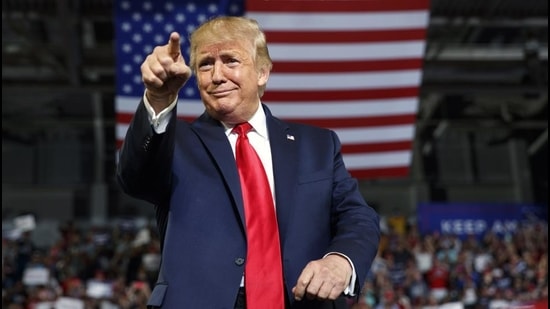Trump acquitted, Biden calls it ‘sad chapter’ for democracy
This was the largest bipartisan vote in the impeachment trial of a US president ever. And it reflected the growing disaffection with Trump in the party.
Former president Donald Trump was acquitted on Saturday, with not enough senators voting to convict him of inciting the riot at the US Capitol on January 6. He will still go down in history as the only American president to have been impeached twice, and acquitted twice.

The motion to convict Trump for the riot received 57 “guilty” verdicts, with seven Republicans joining all the 50 Democrats; and 43 “not guilty”, by all the remaining Republicans. A conviction, which would have barred him from holding any federal office in future, required 67 votes, or two-thirds of the 100-member chamber.
“While the final vote did not lead to a conviction, the substance of the charge is not in dispute,” President Joe Biden said. “This sad chapter in our history has reminded us that democracy is fragile. That it must always be defended. That we must be ever vigilant. That violence and extremism has no place in America. And that each of us has a duty and responsibility as Americans, and especially as leaders, to defend the truth and to defeat the lies.”
This was the largest bipartisan vote ever in the impeachment trial of a US president. And it reflected the growing disaffection with Trump in the party. Seven Republicans declared him guilty this time, compare to only one during his first impeachment trial in January 2020; and 10 House Republicans had voted to impeach him this time, compared to none the last time, in December 2019.
Many of the Republicans who voted “not guilty” on Saturday were at pains to stress they had done so only on a technicality — that the American constitution does not provide for convicting a president who is no longer in office. They denounced him roundly for his role in inciting the insurrection. Among them was Mitch McConnell, the top Republican in the Senate, who voted “not guilty” but said in a speech that Trump was “practically and morally responsible” for the Capitol invasion.

Speaker Nancy Pelosi, a Democrat, lashed out at them, telling reporters later, “What we saw in that Senate today was a cowardly group of Republicans who apparently have no options, because they were afraid to defend their job, respect the institution in which they serve.”
Trump thanked his lawyers and supporters in a statement and sought to play the victim saying the trial was “yet another phase of the greatest witch hunt in the history of our Country’”. He also indicated he will be back — “soon we will emerge with a vision for a bright, radiant, and limitless American future”.
The acquittal may not, however, mark the end of Trump’s legal troubles, both related to the insurrection and other ongoing cases. “President Trump is still liable for everything he did while he was in office as an ordinary citizen,” McConnell pointed to it in his floor speech explaining his vote. “He didn’t get away with anything. Yet.”
A Georgia county opened a criminal investigation last week into efforts by Trump to pressure election officials in the state to overturn his defeat. New York district attorney is investigating financial dealings regarding his signature Manhattan properties, a probe that started two years ago with the payment of hush money by the Trump campaign. And the Southern District of New York has been investigating a non-public probe, according to the Trump’s former lawyer Michael Cohen.
The House of Representatives had impeached Trump on January 13 on the solitary charge of inciting insurrection at the US Capitol on January 6. Incited by him, a mob of supporters had breached the seat of American democracy to prevent a joint session of Congress from verifying President Joe Biden’s election victory. Five people died in the melee, including a police officer. More than 200 people have been charged for alleged involvement since.
The final conviction vote capped a day of dramatic twists and turns, starting with the decision by the impeachment House managers — nine Democratic members of the House of Representatives — to call for witnesses to testify in the trial, a surprising development that could have potentially prolonged the process for days if not weeks.
But the House managers ultimately dropped the move in a deal with Trump’s lawyers, and the trial was back on track, heading speedily for the vote as was expected earlier.
“We’ve offered you overwhelming and irrefutable and certainly unrefuted evidence that former president Trump incited this insurrection against us,” said Representative Jamie Raskin, the lead House manager, launching the team’s closing argument. He and other managers went over some of the evidence they had presented earlier in their case for convicting Trump and tried, but failed, to introduce new ones.
Trump’s defence lawyer Michael van der Veen argued in his closing remarks, “At no point did you hear anything that could ever possibly be construed as Mr Trump encouraging or sanctioning an insurrection. He added: “The act of incitement never happened. He engaged in no language of incitement whatsoever on January 6 or any other day following the election.”
The seven Republicans who voted to convict the former president are Senators Mitt Romney, Bill Cassidy, Richard Burr, Susan Collins, Lisa Murkowski, Pat Toomey and Ben Sasse. “President Trump incited the insurrection against Congress by using the power of his office to summon his supporters to Washington on January 6th and urging them to march on the Capitol during the counting of electoral votes,” Romney, who is also a former presidential candidate, said in a statement. “President Trump also violated his oath of office by failing to protect the Capitol, the vice president, and others in the Capitol. Each and every one of these conclusions compels me to support conviction.”






